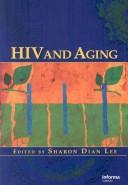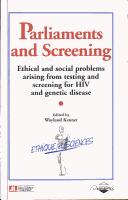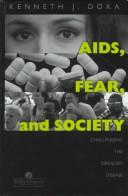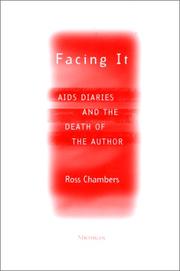| Listing 1 - 10 of 85 | << page >> |
Sort by
|

ISBN: 9781138435018 9780429148323 9781420065978 1420065971 Year: 2008 Publisher: New York : Informa Healthcare,
Abstract | Keywords | Export | Availability | Bookmark
 Loading...
Loading...Choose an application
- Reference Manager
- EndNote
- RefWorks (Direct export to RefWorks)
HEALTH & FITNESS / Diseases / AIDS & HIV. --- MEDICAL / AIDS & HIV. --- HIV Infections --- Aging --- AIDS (Disease) --- Sida --- complications. --- physiopathology. --- physiology. --- Age factors. --- Facteurs liés à l'âge
Book
Abstract | Keywords | Export | Availability | Bookmark
 Loading...
Loading...Choose an application
- Reference Manager
- EndNote
- RefWorks (Direct export to RefWorks)
Fonds Suzan Daniel (FSD)
Aids --- Verpleegkunde --- 616.987 --- Aids (hiv) --- (verpleegkundig) --- aids --- verpleegkundige interventies --- verpleegprocedure --- Sida --- Nursing

ISBN: 274200095X 9782742000951 Year: 1995 Publisher: Montrouge: John Libbey eurotext,
Abstract | Keywords | Export | Availability | Bookmark
 Loading...
Loading...Choose an application
- Reference Manager
- EndNote
- RefWorks (Direct export to RefWorks)
The conference was held at the Royal Society in London in 1994 and dealt with the relation between, on the one hand, the social and ethical consequences of recent headlong advances in molecular biology, and on the other, the national parliaments of Europe, which must either legislate to regulate them, or consiously refrain from doing so. It chose HIV and genetic screening for its particular field, and it also considered the role of the news media.
#GBIB:CBMER --- aids (HIV) --- genetische screening --- sida (VIH) --- dépistage génétique --- Conferences - Meetings
Book
ISBN: 2130467598 9782130467595 Year: 1994 Volume: 2332 Publisher: Paris: PUF,
Abstract | Keywords | Export | Availability | Bookmark
 Loading...
Loading...Choose an application
- Reference Manager
- EndNote
- RefWorks (Direct export to RefWorks)
aids (HIV) --- sida (VIH) --- 616.988 --- AIDS (Disease). --- 614.44 --- AIDS (Disease) --- Sida
Book
ISBN: 9021482150 Year: 1996 Publisher: Amsterdam Em. Querido's uitgeverij
Abstract | Keywords | Export | Availability | Bookmark
 Loading...
Loading...Choose an application
- Reference Manager
- EndNote
- RefWorks (Direct export to RefWorks)
5-0
Dutch literature --- Joegoslavië --- Aids --- Jeugdboeken 13-16 jaar --- 741 --- Proza - Nederlands --- 880 --- AIDS/HIV --- jeugdliteratuur --- littérature jeunesse
Book

ISBN: 1317825764 1317825772 Year: 2000 Publisher: New York : Routledge,
Abstract | Keywords | Export | Availability | Bookmark
 Loading...
Loading...Choose an application
- Reference Manager
- EndNote
- RefWorks (Direct export to RefWorks)
Create effective community-based programs for substance abusers with HIV/AIDS!Substance abusers are the fastest-growing population of people with HIV/AIDS in the US--and one of the hardest to reach and treat. Evaluating HIV/AIDS Treatment Programs offers new strategies for providing care for this vulnerable population. The programs evaluated and discussed in this volume were funded as part of the DHHS Health Resources and Services Administration through its Special Projects of National Significance Program. Collectively known as the SPNS Cooperative Agreement, these 27 projects represent a diverse group of organizations with a common goal: to improve the health, quality of life, and access to health care for traditionally underserved populations living with HIV/AIDS.Evaluating HIV/AIDS Treatment Programs reports in detail the efforts of several community-based HIV/AIDS organizations in the SPNS program. You will learn how these organizations provide high-quality care for persons with HIV who are unlikely to obtain it in the traditional hospital-based service system. This volume offers specific, proven strategies designed to overcome the linguistic, cultural, racial, and economic barriers that make it difficult for some sick people to get the health care they need. It also offers specialized medical care models that work within the context of a continuum of services in a medical clinic.Evaluating HIV/AIDS Treatment Programs also highlights other aspects of the Cooperative Agreement projects, including: a study of end-stage AIDS care an overview of the HRSA HIV/AIDS Bureau SPNS Cooperative Agreement grant initiative a study of conceptual issues in implementing program evaluation in real-world community organizations discussion of the online Knowledge Base that summarizes and disseminates information from the Cooperative Agreement projects studies of ways to reach and care for specific populations with HIV/AIDS, including women, Latinos, Haitians, adolescents, and rural peopleThis valuable volume offers solid data on treating people who are all too often neglected by the medical community even before they contract HIV/AIDS. The programs and ideas presented in Evaluating HIV/AIDS Treatment Programs can be applied to other community-based health initiatives and clinics offering medical care to underserved and vulnerable populations. This essential resource deserves a permanent place on their bookshelf of any physician, administrator, or policymaker working in the fields of HIBV/AIDS, epidemiology, public health, or substance abuse. Visit the book's website at http://www.TheMeasurementGroup.com/drugs_and_society.htm
AIDS (Disease) --- Community health services. --- HEALTH & FITNESS Diseases AIDS & HIV. --- Aids (Disease) --- Community Health Services --- Health & Fitness --- Medical
Book
ISBN: 9028927395 9789028927391 Year: 1999 Publisher: Kapellen Uitgeverij Pelckmans
Abstract | Keywords | Export | Availability | Bookmark
 Loading...
Loading...Choose an application
- Reference Manager
- EndNote
- RefWorks (Direct export to RefWorks)
Fonds Suzan Daniel (FSD)
AIDS --- AIDS (Disease) --- Accompagnement --- Accompaniment --- Acquired immune deficiency syndrome --- Acquired immunodeficiency syndrome --- Acquired immunological deficiency syndrome --- Begeleiding --- SIDA --- 616.97 --- 614.44 --- 604.6 --- 605.92 --- Patiëntenbegeleiding --- 605.11 --- patiëntenbegeleiding --- vrijwilligerswerk --- 61 --- aids (HIV) --- getuigenissen --- sida (VIH) --- témoignages --- bénévolat --- Patients --- 610 --- dood --- AIDS/HIV --- gezondheid --- santé --- Infectious diseases. Communicable diseases --- Dutch literature

ISBN: 1560326816 1560322489 9781560326816 1315061481 9781315061481 1135913501 9781135913502 Year: 1997 Publisher: Washington D.C. London Taylor & Francis
Abstract | Keywords | Export | Availability | Bookmark
 Loading...
Loading...Choose an application
- Reference Manager
- EndNote
- RefWorks (Direct export to RefWorks)
Historically, AIDS is just one of a series of dreaded diseases that have aroused both great fear and irrational actions. The previous diseases, including bubonic plague, syphilis, tuberculosis, leprosy and cancer, have evoked such a sense of dread that rational moves to halt the disease have become compromised. This text examines the deep sense of fear that AIDS evokes, stigmatizing those who suffer from the disease, as well as their families and caregivers. Until AIDS can be seen for what it actually is - a life-threatening disease - policies providing for humane treatment will not evolve. The book also emphasizes that diseases are more than biological phenomena or individual catastrophes - they are profoundly social events. The ways in which diseases are spread and treated are strongly influenced by larger sociological considerations, and they may have the capacity to change social institutions or society Itself. The first part of the book reviews the nature, history and responses of earlier dreaded diseases. The next section examines AIDS itself, proposed as the archetypal dreaded disease. Already creating a sense of panic, AIDS is also shown to be a social disease, likely to have significant effects on the social order. Thus, only by containing the epidemic of fear and controlling the resulting irrationality, can the AIDS epidemic be halted.
aids (HIV) --- epidemie (epidemiologie) --- sida (VIH) --- épidémie (épidémiologie) --- AIDS (Disease) --- Epidemiology. --- History. --- Epidemiology --- Acquired immune deficiency syndrome --- Acquired immunodeficiency syndrome --- Acquired immunological deficiency syndrome --- History --- Social aspects --- Diseases --- Public health --- HIV infections --- Immunological deficiency syndromes --- Virus-induced immunosuppression

ISBN: 128269751X 9786612697517 0472021931 9780472021932 0472109588 9780472109586 0472087487 9780472087488 0472904078 Year: 2009 Publisher: Ann Arbor, MI, USA University of Michigan Press
Abstract | Keywords | Export | Availability | Bookmark
 Loading...
Loading...Choose an application
- Reference Manager
- EndNote
- RefWorks (Direct export to RefWorks)
Explores the connection between the politics of AIDS writing and the ethics of reading.
HEALTH & FITNESS --- Diseases / AIDS & HIV --- AIDS (Disease) --- Acquired immune deficiency syndrome --- Acquired immunodeficiency syndrome --- Acquired immunological deficiency syndrome --- HIV infections --- Immunological deficiency syndromes --- Virus-induced immunosuppression --- Diaries --- Patients --- Diaries. --- Patients.
Book
Year: 2007 Publisher: Washington, D.C., The World Bank,
Abstract | Keywords | Export | Availability | Bookmark
 Loading...
Loading...Choose an application
- Reference Manager
- EndNote
- RefWorks (Direct export to RefWorks)
This paper attempts to quantify the impact of the HIV/AIDS epidemic on social capital with cross-country data. It estimates reduced-form regressions of the main determinants of social capital controlling for HIV prevalence, institutional quality, social distance, and economic indicators using data from the World Values Survey. The results obtained indicate that HIV prevalence affects social capital negatively. The empirical estimates suggest that a one standard deviation increase in HIV prevalence will lead to a 1 percent decline in trust, controlling for other determinants of social capital. If one moves from a country with a relatively low level of HIV prevalence such as Estonia, to a country with a high level such as Zimbabwe, one would observe an approximate 8 percent decline in social capital. These results are robust in a number of dimensions and highlight the empirical importance of an additional mechanism through which HIV/AIDS hinders the development process.
AIDS HIV --- Communities --- Economic Theory and Research --- Epidemic --- Health, Nutrition and Population --- HIV --- Human capital --- Inequality --- Macroeconomics and Economic Growth --- Population Policies --- Poverty Reduction --- Rule of law --- Social Capital --- Social cohesion --- Social Development --- Social networks --- Social norms
| Listing 1 - 10 of 85 | << page >> |
Sort by
|

 Search
Search Feedback
Feedback About UniCat
About UniCat  Help
Help News
News